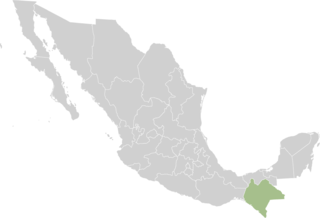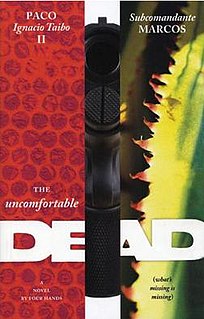 W
WThe Zapatista Army of National Liberation, often referred to as the Zapatistas, is a far-left and libertarian socialist political and militant group that controls a substantial amount of territory in Chiapas, the southernmost state of Mexico.
 W
WThe Chiapas conflict refers to the 1994 Zapatista uprising, the 1995 Zapatista crisis and their aftermath, and tensions between the indigenous peoples and subsistence farmers in the Mexican state of Chiapas from the 1990s to the present day.
 W
WJohn Holloway is a lawyer, Marxist-oriented sociologist and philosopher, whose work is closely associated with the Zapatista movement in Mexico, his home since 1991. It has also been taken up by some intellectuals associated with the piqueteros in Argentina; the Abahlali baseMjondolo movement in South Africa and the Anti-Globalization Movement in Europe and North America. He is currently a professor at the Institute for Humanities and Social Sciences at the Autonomous University of Puebla.
 W
WThe Lacandon Jungle is an area of rainforest which stretches from Chiapas, Mexico, into Honduras and into the southern part of the Yucatán Peninsula. The heart of this rainforest is located in the Montes Azules Biosphere Reserve in Chiapas near the border with Guatemala in the Montañas del Oriente region of the state. Although most of the jungle outside the reserve has been partially or completely destroyed and damage continues inside the Reserve, the Lacandon is still the largest montane rainforest in North America and one of the last ones left large enough to support jaguars. It contains 1,500 tree species, 33% of all Mexican bird species, 25% of all Mexican animal species, 56% of all Mexican diurnal butterflies and 16% of all Mexico's fish species.
 W
WSubcomandante Marcos is the de facto spokesman for the Zapatista Army of National Liberation (EZLN), a Mexican rebel movement. He was also known as Delegado Cero during the EZLN's Other Campaign (2006–2007), and since May 2014 has gone by the name Subcomandante Galeano.
 W
WA Place Called Chiapas is a 1998 Canadian documentary film of first-hand accounts of the Ejército Zapatista de Liberación Nacional (EZLN) the and the lives of its soldiers and the people for whom they fight. Director Nettie Wild takes the viewer to rebel territory in the southwestern Mexican state of Chiapas, where the EZLN live and evade the Mexican Army.
 W
WRebel Zapatista Autonomous Municipalities are de facto autonomous territories controlled by the Neo-zapatista support bases in the Mexican state of Chiapas, founded following the Zapatista uprising which took place in 1994 and is part of the wider Chiapas conflict. Despite attempts at negotiation with the Mexican government which resulted in the San Andrés Accords in 1996, the region's autonomy remains unrecognized by it.
 W
WThe Uncomfortable Dead is a Mexican novel written in conjunction by guerrilla spokesman Subcomandante Marcos of the Zapatista Army of National Liberation (EZLN) and Mexico City crime writer Paco Ignacio Taibo II. The novel is written in the so-called "four hands" method in which one author writes a chapter or segment of the novel, handing it over to the other author who writes the next chapter or segment in response. The method has been compared to a game of ping pong between the authors.
 W
WWomen have been influential in the Zapatista Army of National Liberation (EZLN) Ejército Zapatista de Liberación Nacional, a revolutionary leftist group in Chiapas, Mexico, by participating as armed insurgents and civil supporters. In the 1990s, one-third of the insurgents were women and half of the Zapatista support base was women. The EZLN organization style involved consensus and participation by everyone, including women and children. Therefore, one aspect of the EZLN's ideology was gender equality and rights for women. After the Zapatista uprising in Chiapas, the EZLN announced the Women's Revolutionary Law which was a set of ten laws that granted rights to women regarding marriage, children, work, health, education, political and military participation, and protected women from violence. Prominent figures who joined the movement early on such as Comandante Ramona and Major Ana Maria encouraged other women to join the Zapatistas.
 W
WZapatismo is used by historians to refer to the armed movement identified with the ideas of Emiliano Zapata, leader of the Mexican Revolution, reflected mainly in the Plan de Ayala term 1911. The members of the Liberation Army of the South led by Zapata were known as "Zapatistas".